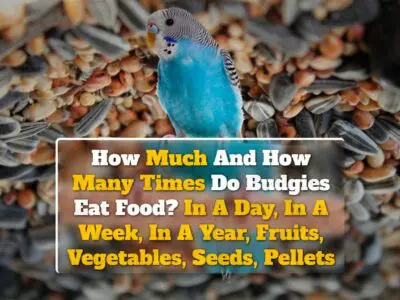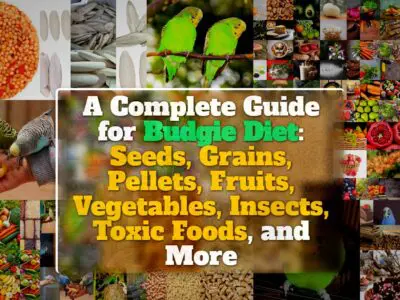Budgies can thrive on both seeds and pellets, but pellets often provide a more balanced diet.
Seeds can lead to nutritional deficiencies if not supplemented properly, whereas high-quality pellets are formulated to meet all a budgie’s dietary needs.
If you’re a budgie owner or considering becoming one, you probably realize how crucial nutrition is for these feathered companions.
Through my journey as a bird lover and former budgie owner, I’ve come to understand the essentials of a balanced budgie diet.
That’s why I’ve put together this guide to compare budgie seeds vs pellets. It will offer insights into their nutritional value, the impacts on a budgie’s health, how to transition from seeds to pellets, and more.
This guide is inspired by my experiences and readings and will serve as a useful resource for budgie parents.
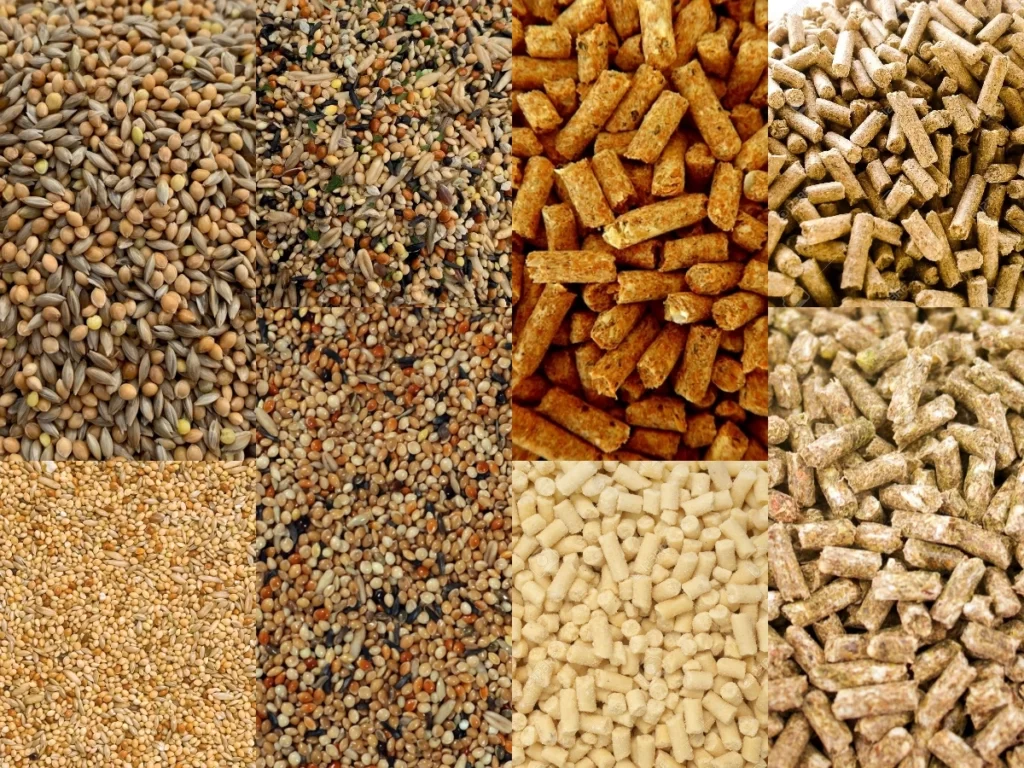
1. Understanding Budgie’s Diet: Seeds and Pellets
A budgie’s diet constitutes an integral part of their overall health and well-being. Budgies, like other pet birds, require a balanced diet filled with diverse nutrients for their optimal health.
Traditionally, their diet has been centered around seeds, which are packed with various nutrients such as proteins, vitamins, and minerals.
However, many bird experts today also recommend pellets, another popular choice of food for budgies.
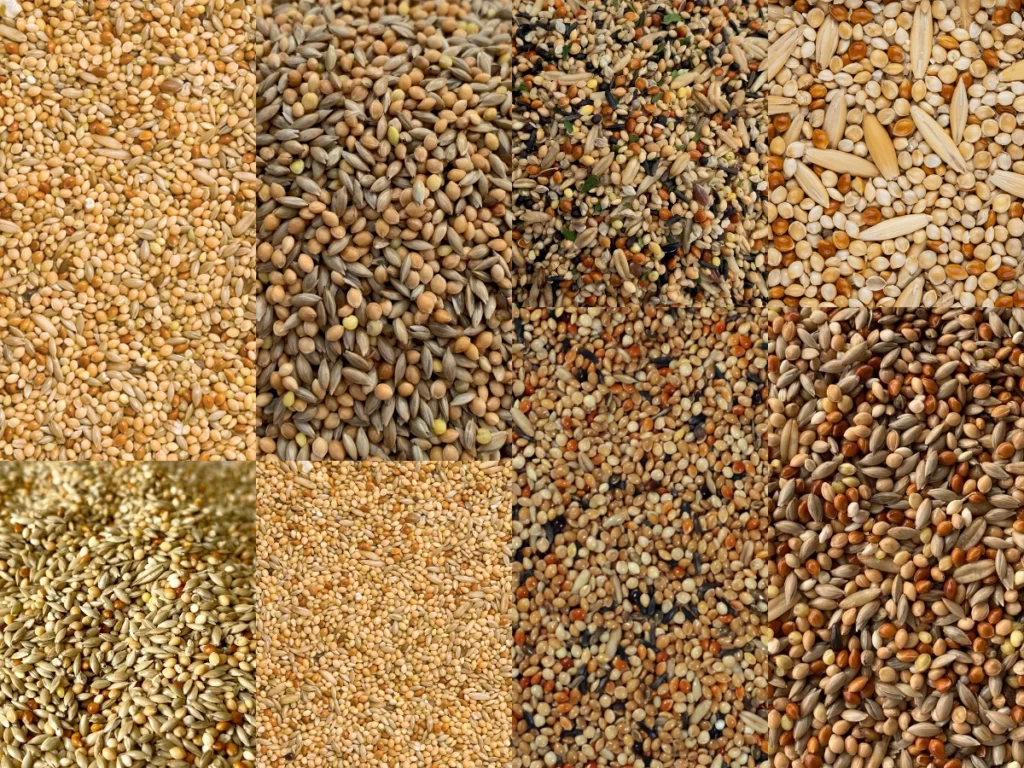
Seeds are typically the natural choice of food for budgies in the wild. They are rich in fat and carbohydrates, providing the energy these lively birds need to sustain their high metabolism.
Seeds such as millets, canary seeds, and oats, are a favorite among budgies. However, the nutritional content can vary significantly depending on the type of seed.
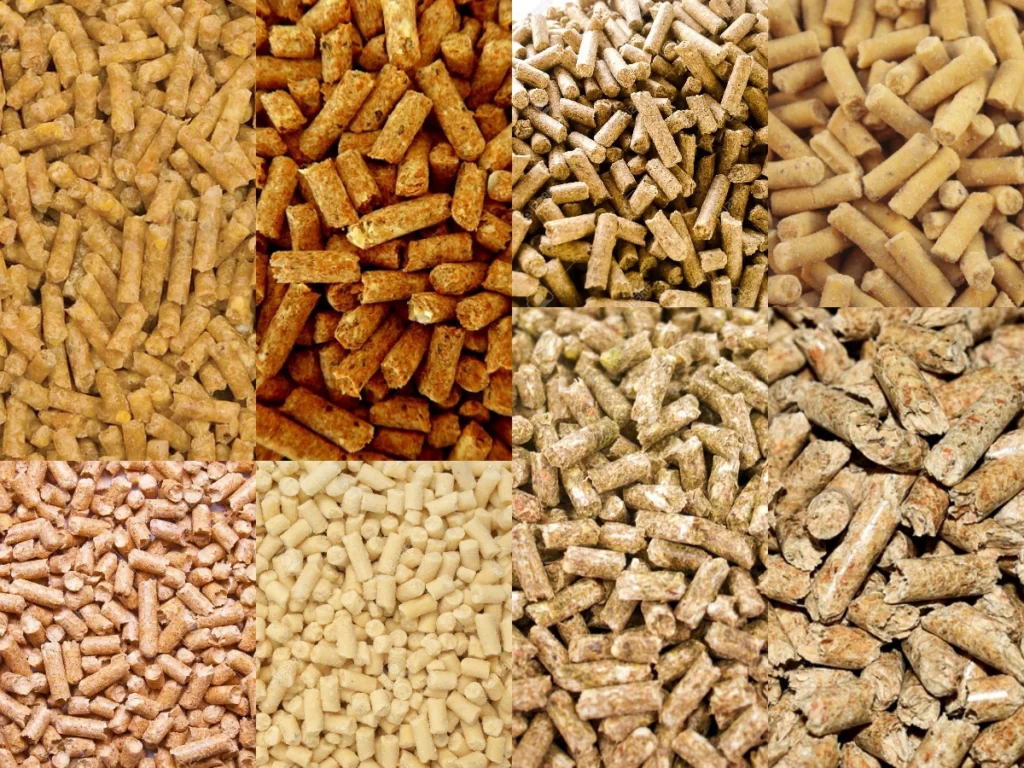
Pellets, on the other hand, are a specially formulated diet that offers a balanced mixture of grains, seeds, fruits, vegetables, and essential vitamins and minerals.
They are designed to cater to the nutritional needs of a budgie, ensuring they get all the necessary nutrients in each bite.
Unlike seeds, which can lead to selective eating, pellets offer balanced nutrition in every piece, preventing the bird from picking out and consuming only their favorite seeds.
2. Comparative Analysis: Seeds Vs. Pellets
When it comes to health and nutritional aspects of seeds, these are an excellent source of proteins, fats, carbohydrates, and certain vitamins and minerals.
Yet, they may not provide all the nutrients needed for a budgie’s overall health. Too much fat in the diet, which is common in a seed-based diet, can lead to health issues.
Besides, seeds can sometimes be low in certain essential vitamins, such as vitamin A and calcium, leading to deficiencies.
In contrast, pellets are formulated to offer a balanced diet and ensure a budgie gets all the necessary nutrients.
They have been crafted to contain the right amount of proteins, fats, carbohydrates, vitamins, and minerals that a budgie needs.
However, each diet comes with its pros and cons. Seeds, for instance, are a more natural diet for budgies and can be more readily accepted by them.
Pellets, although nutritionally balanced, might not be as enticing to a budgie at first.
3. The Impact of Seed-Based Diet on Budgies
Feeding your budgie solely on seeds can have some serious implications. A seed-based diet, although palatable to the birds, can lead to a significant imbalance in their nutrient intake.
For instance, seeds are often high in fats and deficient in essential nutrients like calcium and certain vitamins, which can contribute to health problems such as obesity, liver disease, and vitamin deficiencies.
The long-term health effects of a seed-only diet can be quite detrimental. Continued consumption of a seed-rich diet can lead to fatty liver disease, a common ailment in budgies fed a seed-exclusive diet.
Other potential issues include feather plucking due to nutrient deficiency and a weaker immune system, making the bird more susceptible to diseases.
Consequently, it’s essential to ensure a balanced diet for your budgie to maintain their overall health and longevity.
4. The Impact of Pellet-Based Diet on Budgies
Switching your budgie’s diet to pellets can bring about notable improvements in their health and well-being.
A pellet-based diet is designed to offer a comprehensive nutrient profile that includes all the essential vitamins, minerals, proteins, and carbohydrates that your bird needs.
This balanced nutrition helps to prevent dietary deficiencies and associated health issues that can arise from a seed-exclusive diet.
Over time, the long-term health effects of a pellet-based diet can contribute positively to your budgie’s overall health.
By providing balanced nutrition, pellets can help prevent obesity and liver disease, issues commonly seen in budgies fed a high-seed diet.
A diet rich in the essential nutrients can also boost their immune system, enhancing their resistance to diseases and infections.
Moreover, the consistent intake of required nutrients helps to maintain vibrant feathers, a key indicator of a bird’s health.
5. Converting Budgie’s Diet from Seeds to Pellets: A Step-By-Step Guide
Transitioning your budgie’s diet from seeds to pellets needs to be done gradually and with patience.
Initially, preparing your bird for the transition can involve mixing pellets with their regular seed diet, gradually increasing the pellet proportion over time.
When planning the transition schedule, it is advisable to introduce the new diet slowly. Begin with a mix of 80% seeds and 20% pellets, gradually increasing the pellet ratio over several weeks until the diet consists of entirely pellets.
Ensuring success in the transition involves closely monitoring your budgie’s eating habits and adjusting the plan if necessary.
Regular weigh-ins can help track if your budgie is maintaining a healthy weight throughout the transition.
Dealing with a bird’s resistance to change can be challenging. Budgies may initially avoid the unfamiliar pellets.
Here, persistence is key. Continue to offer pellets, even if they seem uninterested at first.
Over time, your budgie will likely start accepting the new food.
6. What do Wild Budgies Eat? A Look at their Natural Diet
Wild budgies typically have a diet that consists mainly of various types of seeds and occasional fruits, vegetables, and insects.
Their diet varies based on the season and the availability of food sources. They are adept at foraging and can travel great distances in search of food.
The differences and similarities to domestic feeding are worth noting. While seeds form a major part of both wild and domestic budgie’s diet, wild budgies get a more diverse range of nutrients from varying food sources they encounter.
On the contrary, domestic budgies rely on their owners for their nutritional needs, making it important for owners to provide a balanced diet.
7. Essential Factors to Consider When Buying Budgie Food
Choosing the right food for your budgie involves understanding their nutritional requirements and selecting a product that meets these needs.
Whether you are buying seeds or pellets, look for high-quality products that do not contain artificial additives or preservatives.
When buying seeds, look for a mix that contains a variety of seeds like millet, canary seed, and oats.
Avoid seed mixes with a high proportion of sunflower seeds, as these are high in fat.
When selecting pellets, look for those that are specially formulated for budgies. High-quality pellets should contain a balanced mix of nutrients essential for your budgie’s health.
Make sure to check the ingredients list to ensure the pellets are made from natural, wholesome ingredients.
📺 Budgies Eating Seeds & Pellets Videos
Faqs
How Do I Know if My Budgie Prefers Seeds or Pellets?
You can observe your budgie’s eating habits to understand its preference. Often, budgies initially prefer seeds because they’re a part of their natural diet.
However, many budgies can be gradually accustomed to pellets, which offer balanced nutrition.
Can I Feed My Budgie Both Seeds and Pellets?
Yes, a combination of both can be a good approach. Seeds provide a taste of their natural diet, and pellets ensure they get all the essential nutrients.
Just be mindful of the portions to maintain a balanced diet.
Are There Any Risks of a Pellet-Only Diet for Budgies?
While pellets offer balanced nutrition, an exclusive pellet diet can be monotonous and deprive your budgie of the joy of foraging that seeds can provide.
What Nutrients are Missing from a Seed-Only Diet?
A seed-only diet can lead to deficiencies in certain nutrients such as calcium, vitamin A, and certain essential amino acids.
These deficiencies can have an adverse impact on your budgie’s health in the long term.
Can I Make the Transition from Seeds to Pellets Suddenly?
It’s not recommended to make an abrupt switch from seeds to pellets. Budgies are creatures of habit and any sudden change can lead to stress.
Gradual introduction of pellets in their diet is the most successful approach.
Which is More Cost-Effective: Seeds or Pellets?
Generally, seeds are cheaper than pellets. However, considering that pellets provide complete nutrition and may potentially save on vet bills in the long run, they can be seen as more cost-effective.
